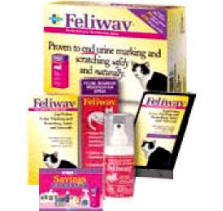Feliway
(also
marketed as Comfort
Zone) mimics a
natural cat pheromone
that produces
a calming effect
for
cats.
A little spray placed
hours before putting a
cat in a kennel or
placing a diffuser near
the litterbox reduces
stress in these areas. Diffusers
in target rooms
or on each floor of the
house
produce a calming effect
on cats and may be
helpful in multiple cat
households. Replace plug-in
diffusers
monthly.
Signs of Feline Stress:

1)
Hiding
2)
Frozen Posture
3)
Aggression (due to fear)
4)
Anorexia (lack of
appetite)
Signs of Feline
Relaxation:
1)
Eating
2)
Sleeping
3)
Self grooming
4)
Exploring the room
5)
Approaching the
litterbox in a relaxed
state.
Feliway is usually
indicated for urine
marking. Evidence
of marking is spraying
urine
on vertical
surfaces.
A normal
urinalysis, serology and
physical exam
help rule out underlying
medical sources of
discomfort. Urination
on horizontal surfaces,
although less common,
may also be marking.
Feliway is also
indicated if the
urination occurs on
peoples' objects or near
power locations such as
doors and windows or
elevated objects.
Another clue that
inappropriate
elimination is marking
in
the
same areas
repeatedly.
Urine or
Feces Marking
Feliway
spray is applied with
one quick spray anywhere
a cat tends to "mark"
when the cat is not
there. The
spray needs to be
applied daily at
approximately 8 inches
from the floor.
When the cat rubs the
area with check glands
instead of marking with
urine, reduce the
Feliway application to
Monday, Wednesday,
Friday for 30
days.
This product is not
indicated for cases
where the inappropriate
elimination is due to a
medical cause such as
bacterial cystitis,
interstitial cystitis,
urolithiasis,
urethritis, neurologic
dysfunction. Medical exams and
diagnostics identify
medical conditions such
as incontinence
or PU/PD due to
diabetes, renal
insufficiency,
pyelonephritis,
pyometra,
hyper-adrenocorticism,
hyperthyroidism, hepatic
insufficiency or primary
polydipsia.